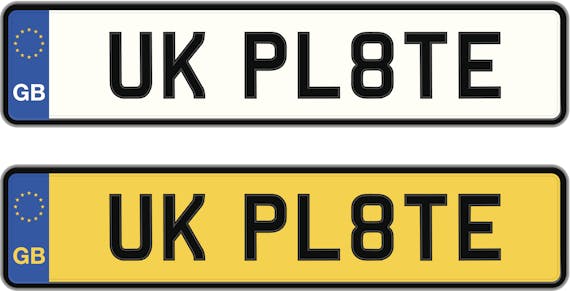New car registration: how it works

There’s always a surge of activity at car dealerships in March and September, with the arrival of new number plates. But why does this happen? And what does it mean for people buying cars both new and used?
Why are there new number plates in March and September?
Every car on the road has to have a number plate. It’s like a car’s birth certificate, a proof of the car’s existence. It's also how we identify a car for all kinds of legal reasons: proof of ownership, taxing it, ensuring that it’s roadworthy and for insurance purposes, for example.
Every car on the road also has to be identifiable in the event of an accident or collision, or if it's involved in any sort of illegal activity – from being stolen to driving in a bus lane.
In the UK, we use a combination of seven letters and numbers on the number plate to identify a vehicle. As there are about two million new cars every year, and about 37 million vehicles on the UK roads, coming up with new combinations of letters and numbers isn’t easy.
One way of doing this is to use similar combinations of letters, but with different numbers, which can be changed year after year. You can read how this is done in our feature on how to understand car number plates.
It used to be the case that there was just one new plate change a year, in August, and car companies were all geared up to make big sales in this month, as car buyers flocked to dealerships to get the latest car with the newest number plate.
But the system that the DVLA uses now, means changing the number twice a year, in March and September. Having two new registration periods every year makes it easier to have enough letter/number combinations available for new cars.
Car buyers still want to buy a new car when the new plates are launched, but now there are two chances to do this every year. If you buy a car in March or September, you not only get a new car with all the latest equipment, but you also get one with a new number plate, so everyone knows that you have a new car. For many car enthusiasts, these bragging rights are important.
Is it a good time to buy a new car?
Even though there are two new registrations a year, the car industry still pours a lot of resources into promoting sales in September.
That means there are often deals to be done, in March and particularly in September. Dealers might offer anything from a few extra-cost options for free to a contribution to the finance package. This is especially the case when the car market is in the doldrums and selling new cars is tough. Dealers need to earn those bonuses, so they’ll go a long way to hit the targets they’ve been set.
Are there other bargains available in March and September?
In the months leading up to the registration changes, car dealers try to make room for the new cars that they want to sell with the new number plates, so they pre-register cars and sell them off at a discount.
One advantage to buyers is that they have a brand-new car – the same as the ones on sale in the new registration period, with all the latest equipment – but at a discounted price. They have a few miles on the clock, perhaps because they've been used for test drives, but not enough to really matter.
The other advantage is that they’re available to drive away from the showroom straight away and buyers don’t need to wait for the car to be built and transported from the factory.
The downsides to buying a pre-registered car are that the buyer is the second owner (the dealer is the first) and that you have no choice about the colour and trim level of the car: it's already been built, so you just have to take what’s available, not something that you choose to your taste and requirements.
And when the registrations change, it’s also a good time to buy used cars. New car buyers often trade in their existing cars in part exchange, which dealerships don’t want hanging around on their forecourts. This means that buyers looking for a used car can get a good deal.
Make searching and staying updated even easier.